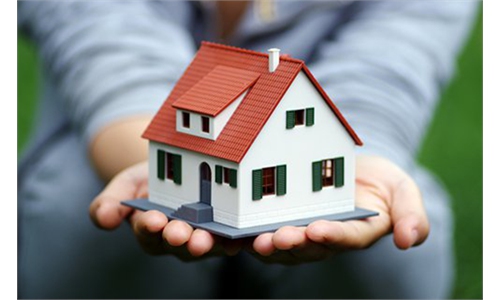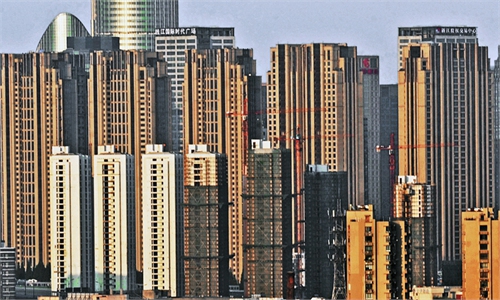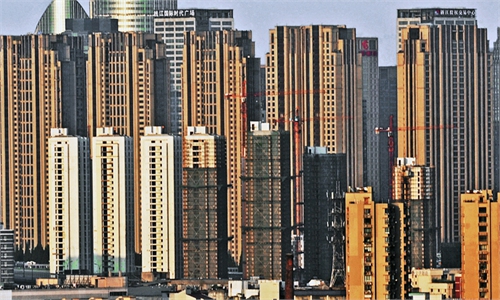Homeowners sell off extra units following China’s property tax pilot plan
Pilot property tax plan to reduce multiple dwelling ownership: experts

File photo: Residents select houses at a sales center of a real estate company in Huaian, East China's Jiangsu Province. Photo: cnsphotos
China's plan to hold five-year trials of levying property taxes in selected cities is curbing speculation and pushing people to sell extra homes, the Global Times has learned.
The pilot program, which may increase the cost of keeping extra apartments, will drive some sales in the short term, but it won't fundamentally change the relationship between supply and demand, experts said.
The Standing Committee of the National People's Congress, China's top legislature, adopted a decision on Saturday to authorize the State Council, China's cabinet, to hold trials of property tax reforms in some regions, according to a report by the Xinhua News Agency.
The pilot program will run for five years and affect all types of real estate, including residential and non-residential properties, but excluding legally owned rural houses, said the report.
Some homeowners in Shenzhen, South China's Guangdong Province, a likely candidate for the pilot reform, are now moving to sell their extra units, local brokers said.
"Due to the recent policies on regulating the real estate market, including the pilot property tax, buyers and owners are now increasingly concerned about the secondhand home market," said a Shenzhen-based agent surnamed Xiao with Lianjia, a leading housing agency in China.
Xiao said that within the past week, his branch added 50 new secondhand homes listed for sale with lower prices.
"The average unit price has dropped by 300,000 yuan ($46,975) to 500,000 yuan. More people are searching for secondhand units, probably due to the lower prices," Xiao told the Global Times on Monday.
Shenzhen has about 2 million secondhand residential units, and if the city is picked up for trying out the pilot reform, the number of secondhand houses will surge on the market, pushing prices down, Song Ding, a research fellow at the Shenzhen-based China Development Institute, told the Global Times on Monday.
Other first-tier cities have also seen an increasing number of secondhand homes for sale.
Beijing property brokers have added more than 10,000 listings for secondhand homes in the past three months, and in Guangzhou, South China's Guangdong Province, more than 8,000 secondhand houses were posted for sale in the past month, according to data from Lianjia.
A Shanghai-based real estate agent surnamed Ma said that the new property tax policy will deal a huge blow to the owners of multiple units.
"The ripples of the property tax are yet to be seen in Shanghai. Due to tighter mortgage policies, both buyers and sellers are tending to wait and see how the policy will play out," he said. "With more detailed policies on the property tax, it is expected that many surplus houses will be put up for sale," he said.
The property tax is expected to target the inventory house market and curb real estate speculation, which may mean there will be more secondhand houses on the market, causing prices to fall, Song Qinghui, an economist told the Global Times on Monday.
"It will deal a blow to speculators, but it will be beneficial to the sound and stable development of the whole property market," Song said.
According to the National Bureau of Statistics, prices of secondhand housing in major first-tier cities fell in September.
Prices in Beijing, Shanghai and Guangzhou fell by 0.2 percent, 0.6 percent and 0.4 percent month-on-month respectively, compared with August. Secondhand home prices in Shenzhen fell by 0.5 percent from August.
The property tax is expected to lower the number of additional homes that people hold, and it will monetize the value of those units as they are sold, Cai Zonghan, a research fellow of China's real estate brokerage company 5I5j Holding Group, told the Global Times on Monday.
"Many households own more than one residential unit, and many are unoccupied," he said.
From 1978 to 2018, China's urban inventory housing increased from less than 1.4 billion square meters to 27.6 billion square meters, and the ratio of housing units per family jumped from 0.8 to 1.09, meaning that on average, each family owns more than one house, according to a report conducted by Ren Zeping, chief economist from Dongwu Securities.
The figure in Germany is 1.02 and in the UK, it is 1.03, according to the report.



